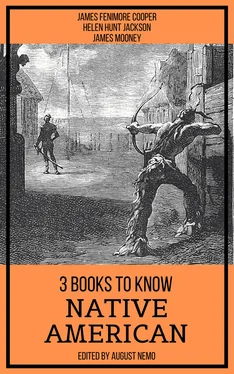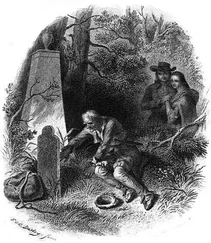19 Some years since, the writer was shooting in the vicinity of the ruins of Fort Oswego, which stands on the shores of Lake Ontario. His game was deer, and his chase a forest that stretched with little interruption, fifty miles inland. Unexpectedly he came upon six or eight ladders lying in the woods within a short distance of each other. They were rudely made, and much decayed. Wondering what could have assembled so many of these instruments in such a place, he sought an old man who resided near for the explanation.
During the war of 1776 Fort Oswego was held by the British. An expedition had been sent two hundred miles through the wilderness to surprise the fort. It appears that the Americans, on reaching the spot named, which was within a mile or two of the fort, first learned that they were expected, and in great danger of being cut off. They threw away their scaling-ladders, and made a rapid retreat. These ladders had lain unmolested thirty years, in the spot where they had thus been cast.
In the meantime, the sisters gladly dismounted, and prepared to enjoy their halt in the coolness of the evening, and in a security which they believed nothing but the beasts of the forest could invade.
“Would not our resting-place have been more retired, my worthy friend,” demanded the more vigilant Duncan, perceiving that the scout had already finished his short survey, “had we chosen a spot less known, and one more rarely visited than this?”
“Few live who know the block-house was ever raised,” was the slow and musing answer; “’tis not often that books are made, and narratives written, of such a scrimmage as was here fou’t atween the Mohicans and the Mohawks, in a war of their own waging. I was then a younker, and went out with the Delawares, because I know’d they were a scandalized and wronged race. Forty days and forty nights did the imps crave our blood around this pile of logs, which I designed and partly reared, being, as you’ll remember, no Indian myself, but a man without a cross. The Delawares lent themselves to the work, and we made it good, ten to twenty, until our numbers were nearly equal, and then we sallied out upon the hounds, and not a man of them ever got back to tell the fate of his party. Yes, yes; I was then young, and new to the sight of blood; and not relishing the thought that creatures who had spirits like myself should lay on the naked ground, to be torn asunder by beasts, or to bleach in the rains, I buried the dead with my own hands, under that very little hillock where you have placed yourselves; and no bad seat does it make neither, though it be raised by the bones of mortal men.”
Heyward and the sisters arose, on the instant, from the grassy sepulchre; nor could the two latter, notwithstanding the terrific scenes they had so recently passed through, entirely suppress an emotion of natural horror, when they found themselves in such familiar contact with the grave of the dead Mohawks. The gray light, the gloomy little area of dark grass, surrounded by its border of brush, beyond which the pines rose, in breathing silence, apparently, into the very clouds, and the death-like stillness of the vast forest, were all in unison to deepen such a sensation.
“They are gone, and they are harmless,” continued Hawkeye, waving his hand, with a melancholy smile, at their manifest alarm: “they’ll never shout the war-whoop nor strike a blow with the tomahawk again! And of all those who aided in placing them where they lie, Chingachgook and I only are living! The brothers and family of the Mohican formed our war-party; and you see before you all that are now left of his race.”
The eyes of the listeners involuntarily sought the forms of the Indians, with a compassionate interest in their desolate fortune. The dark persons were still to be seen within the shadows of the block-house, the son listening to the relation of his father with that sort of intenseness which would be created by a narrative that redounded so much to the honor of those whose names he had long revered for their courage and savage virtues.
“I had thought the Delawares a pacific people,” said Duncan, “and that they never waged war in person; trusting the defence of their lands to those very Mohawks that you slew!”
“’Tis true in part,” returned the scout, “and yet, at the bottom, ’tis a wicked lie. Such a treaty was made in ages gone by, through the deviltries of the Dutchers, who wished to disarm the natives that had the best right to the country where they had settled themselves. The Mohicans, though a part of the same nation, having to deal with the English, never entered into the silly bargain, but kept to their manhood; as in truth did the Delawares, when their eyes were opened to their folly. You see before you a chief of the great Mohican Sagamores! Once his family could chase their deer over tracts of country wider than that which belongs to the Albany Patteroon, without crossing brook or hill that was not their own; but what is left to their descendant! He may find his six feet of earth when God chooses, and keep it in peace, perhaps, if he has a friend who will take the pains to sink his head so low that the ploughshares cannot reach it!”
“Enough!” said Heyward, apprehensive that the subject might lead to a discussion that would interrupt the harmony so necessary to the preservation of his fair companions: “we have journeyed far, and few among us are blessed with forms like that of yours, which seems to know neither fatigue nor weakness.”
“The sinews and bones of a man carry me through it all,” said the hunter, surveying his muscular limbs with a simplicity that betrayed the honest pleasure the compliment afforded him: “there are larger and heavier men to be found in the settlements, but you might travel many days in a city before you could meet one able to walk fifty miles without stopping to take breath, or who has kept the hounds within hearing during a chase of hours. However, as flesh and blood are not always the same, it is quite reasonable to suppose that the gentle ones are willing to rest, after all they have seen and done this day. Uncas, clear out the spring, while your father and I make a cover for their tender heads of these chestnut shoots, and a bed of grass and leaves.”
The dialogue ceased, while the hunter and his companions busied themselves in preparations for the comfort and protection of those they guided. A spring, which many long years before had induced the natives to select the place for their temporary fortification, was soon cleared of leaves, and a fountain of crystal gushed from the bed, diffusing its waters over the verdant hillock. A corner of the building was then roofed in such a manner as to exclude the heavy dew of the climate, and piles of sweet shrubs and dried leaves were laid beneath it for the sisters to repose on.
While the diligent woodsmen were employed in this manner, Cora and Alice partook of that refreshment which duty required much more than inclination prompted them to accept. They then retired within the walls, and first offering up their thanksgivings for past mercies, and petitioning for a continuance of the divine favor throughout the coming night, they laid their tender forms on the fragrant couch, and in spite of recollections and forebodings, soon sank into those slumbers which nature so imperiously demanded, and which were sweetened by hopes for the morrow. Duncan had prepared himself to pass the night in watchfulness near them, just without the ruin, but the scout, perceiving his intention, pointed towards Chingachgook, as he coolly disposed his own person on the grass, and said —
“The eyes of a white man are too heavy and too blind for such a watch as this! The Mohican will be our sentinel, therefore let us sleep.”
“I proved myself a sluggard on my post during the past night,” said Heyward, “and have less need of repose than you, who did more credit to the character of a soldier. Let all the party seek their rest, then, while I hold guard.”
Читать дальше












